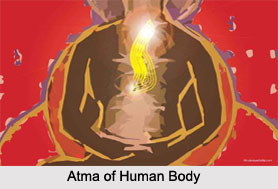 The word `Atma` is derived from `an` means `to breathe`, which is `the breath of life`. The meaning of the got changed with time and it covered life, soul, self or essential being of the individual. According to Sankara, `Atma` means `to derive`, `to eat` or `pervade all`. It is the principle of man`s life.
The word `Atma` is derived from `an` means `to breathe`, which is `the breath of life`. The meaning of the got changed with time and it covered life, soul, self or essential being of the individual. According to Sankara, `Atma` means `to derive`, `to eat` or `pervade all`. It is the principle of man`s life.
`Atma` remains when everything that is not the self is abolished. Atma is the highest self.
The `Atma` is not an object of any sort but is the eternal subject. We hear, touch, see, feel and think by the atman. The `Atma` continues despite the shutting off of consciousness, which is exalted above waking and sleeping. When a man withdraws from all outward things, by retreating into the ground of soul, in the remotest depth of the soul, we find the Infinite.
`Atman` is the Sanskrit word for the soul of a man. Professor Radhakrishnan says in his exposition of the philosophy of the Upanishads, `Atma` is the `God`s dwelling place`. Brahman is the Atman, and the Atman is the Brahman. The real thing in each of us is the self or `Soul`. According to the Hindu religion, `Atman` means, the union of the collective human soul with God (Brahma), eventually merged in the absolute totality of Brahman.
Again according to the early prose Upanishads, `Atman` is the principle of the individual consciousness and Brahman the super personal ground of the cosmos. Brahman, the first principle of the universe, is known through atman, the inner self of man. `Atma` never dies or takes birth. A person dies with his physical existence like the body perishes but the `Atma` exists all the time.



















